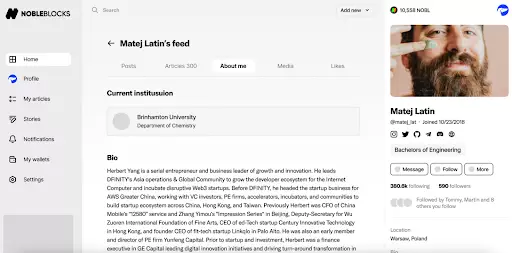Scientific publishing has long been dominated by traditional gatekeepers who benefit financially from the hard work and findings of the scientific community. This has led to an unequal distribution of resources and the centralization of science. Despite efforts to widen access through digital evolution, challenges such as article suitability, high fees, and complex review processes remain prevalent. The most prestigious journals charge exceptionally high fees to researchers and their institutions for publishing impactful findings, creating barriers to widespread dissemination of knowledge. While free platforms like ArXiv or SciHub have tried to address some of these issues, they lack quality control and authentication mechanisms, leaving gaps in the scientific publishing space.
Blockchain technology has emerged as a transformative force against the inefficiencies and inequalities in scientific publishing. By implementing a decentralized science (DeSci) model, blockchain streamlines the publication process, improves the clarity of peer reviews, and promotes fairness in the scientific community. Drawing parallels from other industries that have successfully transitioned to user-friendly models, the scientific publishing sector can benefit greatly from adopting blockchain technology. The centralized approach in science publishing often leads to overlooking radical ideas that challenge established norms, causing many researchers to face rejection during the peer review process.
NobleBlocks is a platform that reimagines the peer review process, aiming to mitigate biases and promote fairness in the dissemination of scientific knowledge. By using a blockchain-based DeSci model, NobleBlocks establishes a public infrastructure for creating, reviewing, storing, and distributing scientific knowledge equitably. The platform simplifies scientific publishing by leveraging blockchain principles to enable worldwide participation across all disciplines. NobleBlocks eliminates financial barriers for authors by offering a cost-efficient publishing process that incentivizes quality contributions throughout the peer review process. The platform’s token-based economy empowers researchers to trade and exchange research hours directly, bypassing traditional financial barriers and expensive publishing fees.
Moving forward, NobleBlocks aims to further integrate artificial intelligence (AI) to enhance the efficiency and capabilities of the publishing process. By leveraging cutting-edge technology, the platform seeks to improve scholarly communication and data privacy in academic publishing. The successful completion of the pre-sale phase for NobleBlocks’ native token, NOBL, in less than five minutes indicates the potential impact of the project in reshaping the scientific publishing landscape. Through its efforts, NobleBlocks invites researchers, scholars, and innovators to explore the new era of scientific publishing and contribute to a fairer, more accessible future for innovation.
The adoption of blockchain technology in scientific publishing has the potential to revolutionize the way knowledge is disseminated and ensure a more equitable distribution of resources in the scientific community. By implementing decentralized science models like NobleBlocks, researchers and academics can overcome existing challenges in scientific publishing and pave the way for a more efficient, transparent, and accessible future for innovation.


Leave a Reply